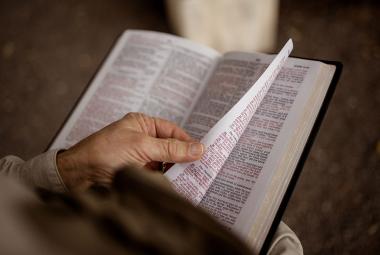One of the most strategic locations in the Roman world was the isthmus of Corinth. This narrow neck of land between the Corinthian Gulf and the Saronic Gulf guaranteed its continued commercial prosperity. The transit across this isthmus avoided the long, risky voyage around the rocky, storm-tossed capes at the south of the Peloponnesus. It was literally the crossroad of the world where the north-south trade routes intersected the east-west traffic. It thus became one of the most dominant cultural centers of its day: materially prosperous, intellectually alert, and morally corrupt. Even in the pagan world the city was known for its moral corruption. ("Corinth" came to imply licentiousness; korinthiazesthai, "Corinthianize," meant to live in debauchery.) It was Hollywood, Las Vegas, and New York all rolled into one.
It is no wonder then that the letters to the church at Corinth embody so many of the concerns that plague us today. It is also impressive to discover how many basic Christian issues are addressed in these two (remaining) letters Paul wrote to the church at Corinth: the "foolishness" of God contrasted with the "wisdom" of man,1 the distinction between salvation and rewards,2 problems of church discipline,3 resorting to lawsuits, 4 marriage and divorce,5 Christian liberty,6 the Lord's Supper,7 and the troublesome issues concerning speaking in tongues.
The Spiritual Gifts
The most thorough treatment of the controversial issue of the spiritual gifts is the focus of Chapters 12 to 14. [Remember: the chapters were not divided up until the 13th century; the verses not until the 16th.] The gifts are, indeed, also for today, but are as diverse as there are ministries. The Spirit divides them as He will (1 Corinthians 12): there are a diversity of gifts, but one spirit;8 there are a diversity of members, but one body;9 there is a diversity of service, but one church.10 Despite an excessive focus by some, the gift of tongues is not the most important: Paul indicates that the greatest of the gifts is prophecy (1 Corinthians 14): it most edifies the church;11 it most convinces outsiders; 12 and yet, its use should be orderly. 13 Furthermore, an entire chapter on "a more excellent way" is wedged between these two pivotal chapters on spiritual gifts: 1 Corinthians 13! The gifts are valueless without love: this most famous of all chapters emphasizes the utter necessity of love,14 the moral excellency of love,15 and the abiding supremacy of love.16
Fabulous stuff, indeed! Although there is yet another chapter that Paul seems to insist is the most important chapter in the Bible! It deals with a subject without which we have nothing!17 The Resurrection: 1 Corinthians 15. This chapter opens with the precise definition of the Gospel. It is surprising to many to discover what, in fact, the Gospel actually is. It is even more astonishing to discover that it is not preached in most pulpits in America! Paul makes no mention of Jesus' teaching: many will acknowledge His profound instruction. Paul makes no mention of His example: many will extol aspects of His personal life. Paul makes no mention of His miracles: many will even acknowledge that He did miracles. None of these things are the Gospel (Cf. 1 Corinthians 15:1-4). This profound chapter then reveals the seven transitions which are destined for the believer!
Four Letters and Three Visits?
Paul's first visit was when the church was founded. Paul wrote an initial letter to the Corinthian church, "the previous letter," 18 a letter which apparently perished. 19 This letter had been misunderstood 20 and Paul mentioned it to clear up a misconception. The household of Chloe then brought Paul news of cliques in the church 21 and the church wrote him a letter 22 (presumably brought to Ephesus by Stephanas, Fortunatus and Achaicus,23 who probably added their own comments). The situation was serious. Paul responded with the letter we know as "First Corinthians." The situation worsened. Paul felt it necessary to leave his work in Ephesus and to pay a hurried visit in an attempt to set things right. (This visit is implied in passages in 2 Corinthians, which speak of Paul as being ready to pay a third visit to Corinth.) 24 His references to coming again in sorrow indicate that this visit had not been a pleasant one ("the painful visit"). 25 It failed to clear up the situation and Paul went away profoundly disturbed. Paul determined to write another letter ("The Severe Letter"), obviously very severe in tone and it cost him much to write. 26 Had it not been successful it might have meant a final rupture between Paul and this church he had founded. This letter seems to have been lost.27 This "Severe Letter" was apparently taken by Titus, who was to return via Macedonia and Troas. Paul was impatient to know how it had been received. When he eventually catches up to Titus, he learns that all went well.28 Out of his great relief and joy, Paul wrote a fourth letter which we call "Second Corinthians" (which may also include fragments of the other lost letters). Paul reaffirms his credentials and answers his critics. This letter has also been described as "an impassioned self-defense of a wounded spirit to erring and ungrateful children..." Almost certainly he visited the church soon afterwards (his third visit?).
Relevance to Today
As the "worldly church," Corinth certainly becomes increasingly relevant to us in our own day of materialism, moral decay, and church controversies. Paul unflinchingly addresses many of the tensions which entangle all of us, and the careful study of the Corinthian letters is guaranteed to impact each of us in our own walk and fellowships. The placement of these letters - immediately following the definitive Book of Romans - seems conspicuously appropriate, and richly rewarding, to the diligent student of God's Word! A serious review of these letters should prove highly appropriate for each of us as we return from our summer routine to address the challenges of the fall season. . . Good hunting!
Notes:
- 1 Cor 1, 2.
- 1 Cor 3:11-15.
- 1 Cor 5.
- 1 Cor 6.
- 1 Cor 7.
- 1 Cor 8 - 10.
- 1 Cor 11.
- 1 Cor 12: 4-11.
- 1 Cor 12: 12-27.
- 1 Cor 12: 28-31.
- 1 Cor 14: 1-22.
- 1 Cor 14: 23-28.
- 1 Cor 14: 29-40.
- 1 Cor 13: 1-3.
- 1 Cor 13: 4-7.
- 1 Cor 13: 8-13.
- 1 Cor 15:12-19.
- 1 Cor 5:9.
- Possibly preserved as 2 Cor 6:14 - 7:1.
- 1 Cor 5:9-10.
- 1 Cor 1:11.
- 1 Cor 7:1.
- 1 Cor 16:17.
- 2 Cor 12:14; 13:1; Paul's 2nd visit is past, 13:2.
- 2 Cor 2:1.
- 2 Cor 2:4; 7:8.
- Partly preserved in 2 Cor 10-13?
- 2 Cor 2:12-17; 7:5-7, 13.






